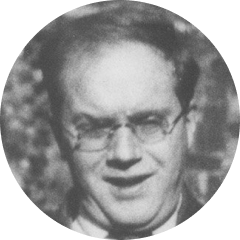Conrad Aiken
(1889–1973)
Conrad Aiken (1889–1973): American poet and critic. Though he and Eliot were a year apart at Harvard, they became close friends, and fellow editors of the Harvard Advocate. Aiken wrote a witty memoir of their times together, ‘King Bolo and Others’, in T. S. Eliot: A Symposium ed. Richard Marsh and Tambimuttu (1948), describing how they revelled in the comic strips of ‘Krazy Kat, and Mutt and Jeff’ and in ‘American slang’. In the 1920s he settled for some years in Rye, Sussex. His writings include volumes of poetry such as Earth Triumphant (1914); the Eliot-influenced House of Dust (1921); Selected Poems (1929), which won the Pulitzer Prize; editions of Modern American Poets (1922) and Selected Poems of Emily Dickinson (1924); and Collected Criticism (1968).
Aiken’s eccentric autobiographical novel Ushant: An Essay (1952) satirises TSE as ‘Tsetse’. On 7 Nov. 1952 TSE thanked Aiken for sending him an inscribed copy: ‘It is certainly a very remarkable book. After the first few pages, I said to myself, this is all very well for a short distance, but can he keep it up through 365 pages without the style becoming oppressive? Anyway, you have done it, and I have read the book through with unflagging interest and I hope that it will have a great success.’ Asked in Feb. 1953, by the editor of the Carolina Quarterly, if he would contribute to a symposium on Ushant, TSE replied in 17 Feb. that he had no time to prepare a critical piece but that ‘Ushant fully deserves such extended and varied critical treatment.’ However, TSE was to write to Cyril Connolly on 17 Apr. 1963: ‘Aiken is an old & loyal friend – I don’t think he is a booby, though Ushant is a curiously callow work.’
Stephen Spender noted in 1966 that Eliot ‘once told me that he always felt disturbed and unhappy that … Aiken, had had so little success as a poet. “I’ve always thought that he and I were equally gifted, but I’ve received a large amount of appreciation, and he has been rather neglected. I can’t understand it. It seems unjust. I always worries me”’ (‘Remembering Eliot’, The Thirties and After [1978], 251). See too Selected Letters of Conrad Aiken, ed. Joseph Killorin (1978); Edward Butscher, Conrad Aiken: Poet of White Horse Vale (1988).
